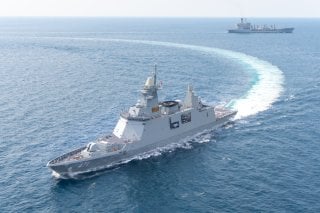America’s Pacific Partnerships Are Secure—For Now
Washington needs to keep the momentum going.
After four months of intense negotiations, the House and the Senate renewed funds for key security agreements with three Pacific Island allies that President Joe Biden recently signed into law. This accomplishment is worth celebrating, but the United States must avoid falling into the trap of patting itself on the back. Now more than ever, America must put its foot on the gas and be a proactive partner throughout the Pacific to counter China and protect its national security interests.
The agreements, known as the Compacts of Free Association, grant the United States exclusive defense privileges in exchange for economic assistance and access to federal programs for the Federated States of Micronesia, the Marshall Islands, and Palau. These agreements play an important role in U.S. military strategy, as they allow the military to test missiles and place military installations in favorable positions in the Pacific, countering Chinese ambitions in the region.
The Compacts also gave the United States “strategic denial rights,” which allowed Washington to prevent any third-party military, such as China, from entering the territorial waters of the three Compact states. The Compact states’ territories “effectively expand the United States for defense purposes to cover an expanse of the Pacific larger than the 48 contiguous United States, stretching from west of Hawaii to the Philippines and Indonesia.”
In short, Congress and the Administration should be celebrating the extension of the Compacts’ key economic provisions for twenty more years. But American policymakers shouldn’t be complacent. Instead, they should keep the momentum going. Unless the United States takes advantage of this window of opportunity to be a proactive partner in the broader Pacific between now and the early 2040s, the benefits offered by these new agreements won’t be fully realized.
That begins with rebuilding trust.
The delays and the political challenges that funding faced in getting to the finish line drew concerns from Pacific leaders. Notably, President Hilda Heine of the Marshall Islands warned that U.S.-Marshall Islands relations were “being gradually destroyed” due to the delay in renewing the Compacts. The ambassadors of Australia and New Zealand even sent a letter to Congress voicing concerns about its slow pace of renewing the Compacts. The Japanese ambassador also sent a letter to Congress to “emphasize the importance of [COFA]” for “all like-minded partners.”
Washington could ease some of these concerns by making a stronger case as the region’s partner of choice. First, agreements or initiatives with Pacific states, including many of the programs within the U.S. Pacific Partnership Strategy, need to receive a much higher priority moving forward. High-ranking government officials should make more frequent and visible visits to the Freely Associated States and other Pacific states and emphasize what America brings to the table for the region. To date, no U.S. President has ever visited a Pacific Island state.
Second, agreements must expand into other common areas of interest, including combating illegal fishing, providing maritime security to enforce laws and tackle drug trafficking, and developing projects that enhance environmental resilience and attract new investments. Such cooperation can provide win-win deals that preserve the United States and Pacific Islands’ interests while countering Chinese advancements throughout the region.
Finally, while the Compact states will—and should—always have a special relationship with the United States, Washington should look to bolster its partnerships throughout the region. From supporting new engagements with Pacific states to strengthening existing partnerships through the Partners in the Blue Pacific initiative, the United States can maximize its advantage in alliances over China and demonstrate long-term commitment to the region.
If the United States fails to do this, it risks losing out to China, which is becoming increasingly aggressive in the Pacific. Already, Beijing has weaponized regional tourism, infiltrated media, and disrespected local laws in attempts to persuade Pacific Island nations to recognize China over Taiwan diplomatically. Beijing has also made progress in negotiating deals, most notably with the Solomon Islands, that bring Chinese police forces and enticing infrastructure deals to Pacific nations in dire need of both. Backed by strong commitments in areas Pacific nations care most about, and without the strings attached to Beijing’s proposals, the United States can become the preferred partner of Pacific Island nations and counter China’s ambitions.
Andrew J. Harding is a researcher in The Heritage Foundation’s Asian Studies Center and co-editor of “Winning the New Cold War: A Plan for Countering China.” Follow him on X: @AJ_Harding1.
Image: Shutterstock.com.

